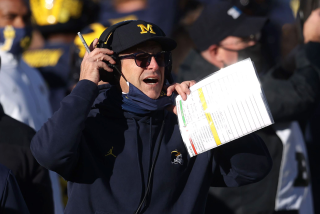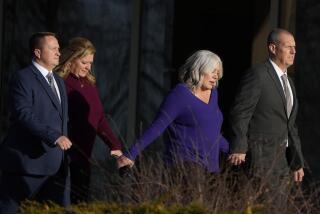Supplement Revelation Rocks Wheeler Case
- Share via
In a revelation described by the judge overseeing the case as a “bomb,” Northwestern University claimed in court this week that a dozen of its football players used supplements banned by the NCAA before the conditioning drill concluding with Rashidi Wheeler’s collapse and death in August 2001.
In a filing to Cook County (Ill.) Judge Kathy Flanagan on Wednesday, Northwestern attorney Eric Quandt said Wheeler and other players took ephedrine-containing Ultimate Punch drink mix or tablets before the drill. Quandt said an athletic department staff member also discovered canisters of Ultimate Punch mix in the lockers of at least three players on the day Wheeler died.
Quandt said in the filing that 10 of the 12 players who ingested Ultimate Punch experienced “some combination of the following: lower extremity weakness, inability to stand, exhaustion, breathing difficulties manifested by prolonged hyperventilation, racing and/or pounding heart, chest pain, numbness in the extremities, nausea and vomiting orange or red fluid, disorientation and lightheadedness.”
Linda Will, the mother of former La Verne Damien High player Wheeler, said in an interview Thursday that the revelation was “nothing more than a clever monetary move.”
She interpreted Quandt’s admission as finger pointing toward Next Nutrition, the Ultimate Punch maker. Northwestern wants Next Nutrition to be made a co-defendant in Will’s wrongful death lawsuit against the university. Northwestern contends ephedrine has been responsible for previous catastrophic health effects.
“They are looking for assistance in the award we will receive,” Will said. “Northwestern has no rebuttal to the factual things surrounding Rashidi’s death -- the fact he was run to death, the life-saving emergency treatment they withheld from him -- so the only thing they can hope to do is tie the supplement manufacturers in with them. What killed my child is that they ran a boot camp and didn’t provide protection.”
Wheeler’s cause of death was reported as exercise-induced bronchial asthma by Cook County coroner Edmund Donoghue. The 22-year-old strong safety, a chronic asthmatic, also had a trace of ephedrine in his system.
Quandt said the disclosures about the presence of supplements in the locker room were made after lawyers for the makers and distributors asked about Northwestern players’ use of stimulants before the conditioning drill -- 28 wind sprints from 40 to 100 yards. Quandt said he is seeking tests of Ultimate Orange and Xenadrine, an ephedrine-containing pill made by Cytodyne Technologies.
Flanagan labeled Quandt’s filing “a bomb,” questioning why the information wasn’t forwarded sooner, and arranging for a Monday court session when Quandt will be asked to identify the employee who found the canisters and the players who stored them in their lockers.
“From [Flanagan’s] perspective, she believes [Northwestern] is seeking to put evidence into the case, but to do that, they have to make the case that Rashidi took these supplements,” said Jim Montgomery, Will’s attorney. “The judge is saying, ‘Is this relevant? Prove it Monday.’ ”
Said Quandt: “I know [Wheeler] took supplements.”
Northwestern players told The Times in the days after Wheeler’s death that they took energy supplements Ultimate Punch, Ultimate Orange and Xenadrine immediately before the drill, and that several collapsed after running. One player said he mistakenly believed the drink was “an energy drink like Gatorade which would help us that day.” An Evanston police report on Wheeler’s death that included an interview with team trainer Tory Aggeler stated Wheeler ingested Ultimate Punch and Xenadrine.
Some health experts argue that ephedrine, combined with warm weather and strenuous exercise, can put a dangerous strain on the heart. Aggeler, who resigned from Northwestern last year, refused to comment Thursday about Wheeler’s case.
Aggeler and Northwestern defensive coordinator Jerry Brown will provide depositions next Thursday, followed Jan. 31 by Northwestern Coach Randy Walker and Athletic Director Rick Taylor. Montgomery said the acknowledgment of the supplement presence and use by players raises obvious questions about what Northwestern’s coaches and trainers knew about supplement use before Wheeler’s death on Aug. 3, 2001.
“Some kids will testify Northwestern knew what they were taking all along and winked at it,” Montgomery said. “They wanted these kids to produce, and produce at all costs.”
NCAA spokeswoman Laronica Conway said Northwestern, which has already served a self-imposed penalty of six lost practices for timing and videotaping the voluntary drill, could be subject to additional sanctions if it provided banned supplements to athletes.
“We did not know, prior to that afternoon, that players were using supplements, or that supplements were on the premises,” Quandt said.
*
Associated Press contributed to this report.
More to Read
Go beyond the scoreboard
Get the latest on L.A.'s teams in the daily Sports Report newsletter.
You may occasionally receive promotional content from the Los Angeles Times.











